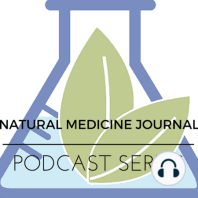35 min listen

Environmental Factors That Affect the Microbiome
Environmental Factors That Affect the Microbiome
ratings:
Length:
23 minutes
Released:
May 25, 2021
Format:
Podcast episode
Description
The gut microbiota has a tremendous impact on immunity. In a recent interview, Editor-in-Chief Tina Kaczor, ND, FABNO, had the opportunity to talk with immunologist and Natural Medicine Journal Editorial Board Member Heather Zwickey, PhD, about environmental factors that affect the gut microbiota. They discussed pesticides, herbicides, and petroleum chemicals and the impacts they can have on the 100 trillion–plus microorganisms that reside in the human gut. About the Expert Heather Zwickey, PhD, is a professor of immunology and chair of the Department of Health Sciences at the National University of Natural Medicine in Portland, Oregon. She launched the Helfgott Research Institute, which advances the science of natural medicine. Zwickey founded the school of graduate studies and developed masters programs in research, nutrition, and global health. Zwickey has received the Champion of Naturopathic Medicine Award from the American Association of Naturopathic Physicians. She currently leads a National Institutes of Health–funded clinical research training program focused on integrative medicine research and studies the gut-brain axis in neuroinflammation. Abbreviated Transcript Tina Kaczor, ND, FABNO: What do you think is the most pressing topic that people need to know about as far as environmental factors that influence the gut? Heather Zwickey, PhD: I think that as we start to discuss gut microbiota, it has such a profound impact on the immune system. And the immune system has really been my focus—neuroimmunomodulation. So when we think about the gut microbiota, we're often thinking about the obvious things that have an effect on it, like antibiotics. But we don't often consider some of the less obvious things that have an effect on microbiota, like pesticides we find in the environment and in our food. Kaczor: When you say pesticides, so you're talking about Roundup, glyphosate, that kind of thing? Zwickey: Sure. Roundup (or glyphosate) is one of the more common pesticides that we find in the environment. There have been studies that detect it in urine. So we are getting measurable levels of glyphosate in our diet. That might come from eating foods that are not organic, or if you live out in the country, it could come from places like your well water, where glyphosate has been sprayed on crops around you and has leached into the well water. The reason that we worry about that is that glyphosate actually has an effect on an enzyme that affects all bacteria. In fact, it affects everything except mammals. So insects like bees that are going to pollinate our fruits and vegetables can be killed by glyphosate. But when we think about glyphosate with respect to humans, we have to remember that we have this microbial community within us, and it is susceptible to glyphosate. Some really recent data has shown that not all microbes in our gut are responsive to glyphosate. Many microbes can use tryptophan and other ring-based amino acids without needing the shikimate pathway, which is what glyphosate blocks. But Lactobacillus and Bifidobacterium, 2 of the big ones, require the shikimate pathway, and glyphosate can kill them. Kaczor: In our world of clinical medicine, we always have outliers who can't seem to hold the Lactobacillus population in their gut. They'll go through courses of probiotics, we'll change brands a few times, and it just keeps going back down to nothing. We probably should be looking more closely at their glyphosate exposure in their urine. Zwickey: Absolutely. You can actually measure their consumption and keep in mind that for most probiotics they're not going to become commensals. So what we need to be doing is addressing the metabolites that make our endogenous Lactobacillus and our endogenous Bifidobacterium grow. And for that, we're really looking at short-chain, fatty acids. Thinking about the metabolites might give us a different direction to go therapeutically. You might want to use a postbiotic or a prebioti
Released:
May 25, 2021
Format:
Podcast episode
Titles in the series (99)
Addressing the Stress-Immune Connection in Clinical Practice: Sponsored by DaVinci Laboratories by Natural Medicine Journal Podcast